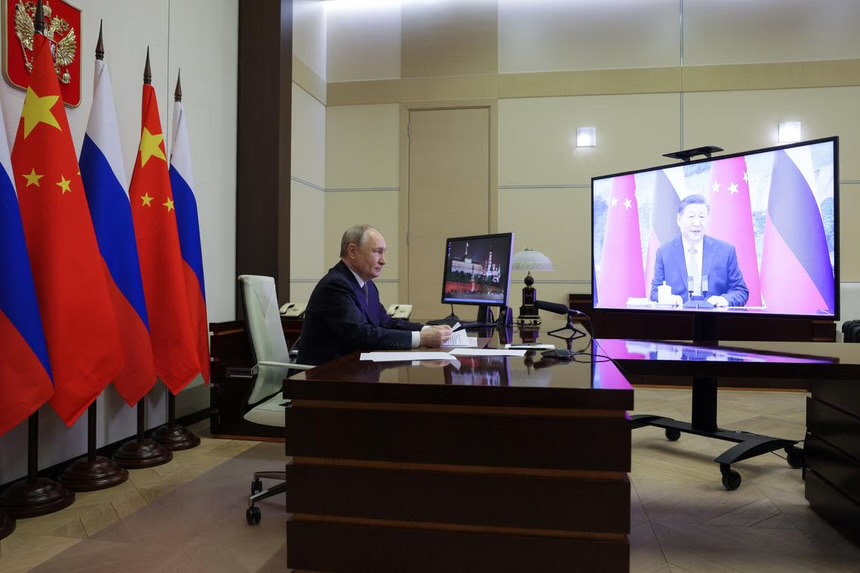Leaders Unite for Strategic Dialogue
Russian President Vladimir Putin and Chinese President Xi Jinping held a high-profile video call on January 21, discussing strategies to strengthen their partnership amidst growing global challenges. This pivotal conversation occurred shortly after Donald Trump assumed office as U.S. President. Over 90 minutes, the two leaders outlined plans for fostering closer ties and shared views on pressing issues, including the Ukraine war and Taiwan.
A “No Limits” Partnership Grows Stronger
The meeting reaffirmed the deepening alliance between Putin and Xi, rooted in their 2022 “no limits” partnership declaration. This collaboration underscores their united stance against Western dominance. Both nations emphasized mutual support for each other’s geopolitical priorities, with Russia backing China’s claim over Taiwan and Beijing signaling its support for Moscow’s interests in Ukraine.
Talks on Ukraine and U.S. Relations
A key focus of the discussions was the ongoing war in Ukraine. Putin expressed interest in a long-term resolution, stressing that any peace agreement must respect Russia’s strategic concerns. Both leaders expressed readiness to engage with the Trump administration, hinting at potential diplomatic overtures to the United States. However, uncertainties loom as Trump’s approach to these conflicts remains unpredictable.
China’s Role in Ukraine Conflict
China’s stance on Ukraine remains delicate. While Beijing has called for peace talks, it has also criticised Western arms supplies to Kyiv, accusing the U.S. of prolonging the conflict. This dual approach positions China as both a potential mediator and a critic of U.S. policies, reinforcing its broader geopolitical rivalry with Washington.
Taiwan: A Flashpoint for Future Tensions
Another significant topic was Taiwan, a longstanding point of contention between China and the West. Xi reiterated China’s commitment to “reunification” with Taiwan, framing it as a non-negotiable priority. Russia echoed its support for Beijing’s one-China policy, underscoring the shared ideology between the two nations against Western intervention in regional matters.
Economic and Energy Cooperation
The leaders also highlighted their growing economic ties, particularly in energy. China remains Russia’s largest oil consumer, providing a critical market amid Western sanctions on Moscow. Beyond energy, the two countries are expanding collaboration in nuclear technology, focusing on advanced reactor designs and fuel reprocessing. These initiatives signify their intent to build self-reliant systems outside Western-dominated supply chains.
Challenges in U.S.-China-Russia Relations
The meeting took place against the backdrop of rising tensions with the U.S. The Biden administration previously labeled Russia and China as significant threats to democracy, a stance likely to influence Trump’s policies. While Putin and Xi expressed willingness to work with the U.S., their call highlighted a shared vision of a multipolar world, challenging Western dominance.
Taiwan’s Defiance
Despite China’s assertive rhetoric, Taiwan continues to reject Beijing’s claims. Taiwan’s leadership maintains that its future should be determined solely by its people. This ongoing defiance is a critical variable in the geopolitics of East Asia, with potential flashpoints that could escalate tensions between global powers.
A Unified Front Against the West
Putin and Xi’s shared worldview portrays the West as declining, with their alliance aimed at reshaping global power dynamics. This alignment provides a counterweight to U.S. influence, emphasising cooperation across military, economic, and technological fronts. Putin and Xi’s collaboration also sends a message of resilience to nations seeking alternatives to Western-led systems.
Looking Ahead
As Trump’s administration begins, the global stage is set for new alliances, conflicts, and diplomatic manoeuvring. Putin and Xi have strengthened partnership poses a challenge to Western strategies, especially in regions like Ukraine and Taiwan. The months ahead will reveal whether this alliance can achieve its goals without provoking larger confrontations with the U.S. and its allies. This evolving partnership is a reminder of the shifting dynamics in global politics, where traditional power structures are increasingly contested by rising coalitions.

